 Global| Jan 22 2008
Global| Jan 22 2008FOMC Takes Aggressive Action
by:Tom Moeller
|in:Economy in Brief
Summary
After an unscheduled meeting, the Federal Open Market Committee today lowered the Federal funds rate by seventy-five basis points to 3.50%. It was the largest cut in the rate since October 1984, followed thereafter by moves either in [...]
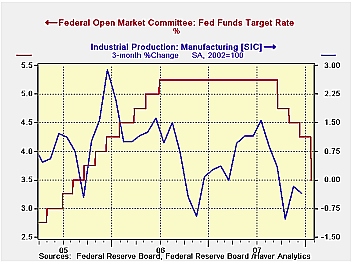
After an unscheduled meeting, the Federal Open Market Committee today lowered the Federal funds rate by seventy-five basis points to 3.50%. It was the largest cut in the rate since October 1984, followed thereafter by moves either in 25 or 50 basis point increments. The rate was last at 3.5% in August of 2005.
Voting against the decision was St. Louis Fed President William Poole.
The discount rate also was reduced seventy-five basis points to 4.00%.
"The Committee took this action in view of a weakening of the economic outlook and increasing downside risks to growth." It came ahead of next week's regularly scheduled meeting of the FOMC.
Worried about even further deterioration in U.S. economic conditions, the Fed indicated that "Appreciable downside risks to growth remain. The Committee will continue to assess the effects of financial and other developments on economic prospects and will act in a timely manner as needed to address those risks."
Still expressing some caution, the FOMC indicated only "that it will be necessary to continue to monitor inflation developments carefully."
For the complete text of the Fed's latest press release please follow this link.
UK Industrial Sector Shows no Signof Weakness, but Hints at Inflationby Robert Brusca January 22, 2008
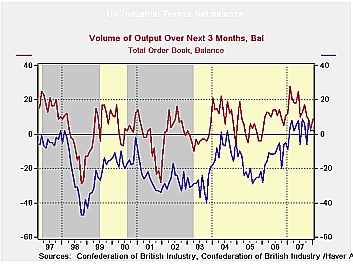
UK orders are holding in positive territory, but not by much.
Order volumes expected in 3-Mos snapped back in January. Prices are
staying very strong in the range in the top seven percent since end
2000. Export orders did tick back down in January to -4 juts below
their 12-month average at -3. On balance the UK industrial sector looks
fairly firm and somewhat inflation prone.
| UK Industrial volume data CBI Survey | |||||||||
|---|---|---|---|---|---|---|---|---|---|
| Reported: | Jan-07 | Dec-06 | Nov-06 | Oct-06 | 12MO Avg | Pcntle | Max | Min | Range |
| Total Orders | -9 | -5 | -6 | -20 | -11 | 74% | 2 | -40 | 42 |
| Export Orders | -3 | -5 | 3 | -11 | -6 | 89% | 3 | -50 | 53 |
| Stocks: Final Goods | 17 | 11 | 2 | 20 | 12 | 63% | 26 | 2 | 24 |
| Output Volume: Next 3-Mo | 12 | 11 | 5 | 9 | 11 | 80% | 22 | -28 | 50 |
| Avg Prices for Next 3 mos | 19 | 8 | 19 | 12 | 10 | 100% | 19 | -30 | 49 |
by Louise Curley January 22, 2008
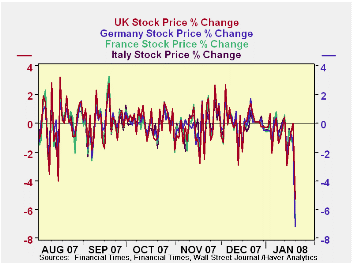
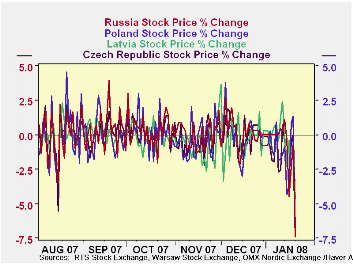
After a day of record declines in stock markets around the world, the Fed announced, in an emergency move, a 75 basis points cut in its benchmark interest rate from 4.25% to 3.50% today. This is the largest cut since the Fed began, in 1990, to use this rate as its principal tool of monetary policy.
Daily prices of many of the stock markets of the world can be
found in the Haver data base, INTDAILY.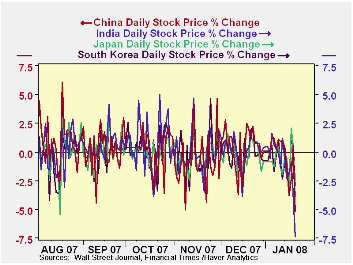 We have
attached five charts showing daily stock price changes in selected
countries in five areas of the world: Western Europe, Eastern Europe,
Asia, South America and the Midlle East. The random nature of the day
to day stock price changes make for messy charts, but unusual movements
such as occurred yesterday do stand out. It should be noted, too that
in several countries, similar stock price declines occurred last
August, when the sub prime crisis was first surfacing.
We have
attached five charts showing daily stock price changes in selected
countries in five areas of the world: Western Europe, Eastern Europe,
Asia, South America and the Midlle East. The random nature of the day
to day stock price changes make for messy charts, but unusual movements
such as occurred yesterday do stand out. It should be noted, too that
in several countries, similar stock price declines occurred last
August, when the sub prime crisis was first surfacing.
The reaction of U.S. and foreign investors to the Fed's dramatic move can be monitored using the high frequency data in the Haver data bases, DAILY and INTDAILY. These data bases contain daily data on interest rates, exchange rates, stock markets and commodity prices
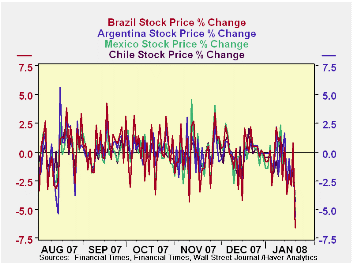
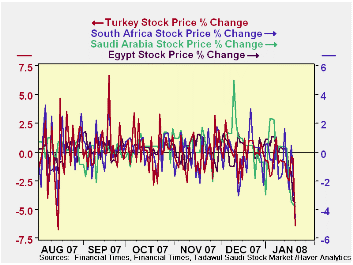
| STOCK MARKETS | Percent Decline January 21, 2008 |
|---|---|
| United Kingdom | 5.27 |
| Germany | 7.16 |
| France | 6.83 |
| Italy | 5.09 |
| China | 5.20 |
| India | 7.81 |
| Japan | 3.86 |
| South Korea | 2.95 |
| Russia | 7.38 |
| Poland | 6.73 |
| Latvia | 4.57 |
| Czech Republic | 4.62 |
| Brazil | 6.60 |
| Argentina | 5.68 |
| Mexico | 5.35 |
| Chile | 4.30 |
Tom Moeller
AuthorMore in Author Profile »Prior to joining Haver Analytics in 2000, Mr. Moeller worked as the Economist at Chancellor Capital Management from 1985 to 1999. There, he developed comprehensive economic forecasts and interpreted economic data for equity and fixed income portfolio managers. Also at Chancellor, Mr. Moeller worked as an equity analyst and was responsible for researching and rating companies in the economically sensitive automobile and housing industries for investment in Chancellor’s equity portfolio. Prior to joining Chancellor, Mr. Moeller was an Economist at Citibank from 1979 to 1984. He also analyzed pricing behavior in the metals industry for the Council on Wage and Price Stability in Washington, D.C. In 1999, Mr. Moeller received the award for most accurate forecast from the Forecasters' Club of New York. From 1990 to 1992 he was President of the New York Association for Business Economists. Mr. Moeller earned an M.B.A. in Finance from Fordham University, where he graduated in 1987. He holds a Bachelor of Arts in Economics from George Washington University.
More Economy in Brief
 Global| Feb 05 2026
Global| Feb 05 2026Charts of the Week: Balanced Policy, Resilient Data and AI Narratives
by:Andrew Cates






